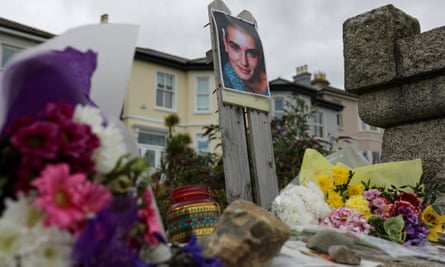In the end it didn’t save her but Sinéad O’Connor lived most of her of final years in Ireland behind a “protective ring” that offered, for a while, the chance of a normal life.
After all the triumphs and agonies that had marked her public life, the singer was able to blend into communities that accepted and to some extent shielded her.
In the seaside town of Bray in County Wicklow, the village of Rooskey in County Roscommon and the village of Dalkey in County Dublin O’Connor found sanctuary from the fame, if not her mental health problems.
Only now, after the announcement of her death at the age of 56, and amid a wave of tributes, residents have shared some of their stories.
Tom Dalton, a musician who ran acoustic singing sessions in a Bray pub, at first did not recognise O’Connor when she joined an eight-strong group one evening in 2019. She wore a hijab and used her Muslim name, Shuhada’ Sadaqat.
O’Connor lived nearby and had spotted a sign advertising the session. Strumming a guitar, she sang a song solo, then a verse of Amazing Grace.
By then Dalton had cottoned on to who she was. “But I treated her the same as everybody else,” he said. “Nobody asked her for photographs. I didn’t upload the video at the time because it was just us, and it was beautiful. And she had retired from music.”
When O’Connor settled in Bray, the community formed a “protective ring” around her, Erika Doyle, a town councillor, told the Irish Independent.
“Quite by chance, I met her and we became friendly for a period. One day I was walking along the seafront and saw a paparazzo start to set up in a shelter across from her house. I called her to let her know. She laughed and said three or four locals had already been in touch.”
There have been unverified reports that O’Connor paid medical bills for impoverished Bray residents. This week local residents left flowers, candles and poems at the front of her former house, which she sold in 2021, and there were calls for a mural or statue of the singer.

O’Connor quietly moved to a house overlooking a lake in the remote Kilglass area of Roscommon, in the centre of Ireland.
Half the community knew of her presence, the other half did not, Eugene Murphy, a senator, told the Shannonside Northern Sound radio. The area offered a retreat – local residents spotted her in cafes and supermarkets but did not bother her, he said.
“I think she found that peace here, she walked the roads here, she shopped locally. So she led a very ordinary down to earth life.”
O’Connor moved to a small cottage in Dalkey, a coastal Dublin suburb that is home to Bono and other celebrities, and even there found anonymity.
The film director Neil Jordan told the public broadcaster RTÉ: “I was walking down there and she was sitting outside on the bench, just smoking cigarettes and all these tourists were passing by and had no clue who she was.”
No amount of privacy could protect O’Connor when her 17-year-old son Shane disappeared on 6 January 2022 after leaving a hospital where he had been on suicide watch.
“My world would collapse without you,” she wrote on social media. “You are my heart. Please don’t stop it from beating. Please don’t harm yourself.” Police found his body the next day.
O’Connor’s grief was partly played out on social media but she found the will to continue. In March she accepted an award for her second album, I Do Not Want What I Haven’t Got, released in 1990, at the Choice music awards in Dublin. She received a standing ovation and dedicated the award to refugees.
This month she moved to London, a city she loved, to complete a new album, No Veteran Dies Alone. There was talk of an Australia tour. She looked forward to writing new tunes, she said in a Twitter video post.
Neighbours said she spent long periods looking down from her balcony and left lights on and windows open all night. In separate social media posts, O’Connor said she had lost the love of her life and lamp of her soul. She likened her grief to purgatory.
‘She found peace here’: local people tell of Sinéad O’Connor’s last years in Ireland - The Guardian
Read More
No comments:
Post a Comment